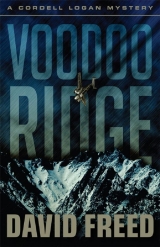
Текст книги "Voodoo Ridge"
Автор книги: David Freed
Жанр:
Триллеры
сообщить о нарушении
Текущая страница: 6 (всего у книги 17 страниц)
“Just wanted to let you know we’ve notified every local law enforcement agency to be on the lookout for your lady. The print tech’s wrapping things up back at your room. We’ll get results soon as we can.”
“OK.”
He cocked his head and gave me a hard look. “You didn’t have anything to do with any of this, did you?”
“Any of what?”
“Her disappearance.”
I swallowed down the urge to do the deputy harm and jammed my hands in the pockets of my jacket.
“You want to polygraph me? Fine, let’s go now.”
“You might want to talk to an attorney first.”
“I don’t need an attorney, Streeter. What I need is for you to do your goddamn job. Go find my woman.”
Streeter nodded subtly, like I’d just passed some sort of test. “Every suspect, you ask them if they did it, they’re always calm. ‘No. It wasn’t me, officer. I didn’t do it.’ When you know damn well they did. Nobody ever raises their voice. Nobody looks like they want to punch your lights out – unless they didn’t do it. For what it’s worth, Mr. Logan, I believe you.”
I looked past the Wrangler, hoping I might see Savannah, and said nothing.
“You probably want to change out of those wet clothes,” Streeter said.
“Probably.”
“I’ll give you a lift back to your room.”
I climbed in. The heater was on high. It felt good.
Streeter put the Wrangler in gear, checked his mirrors, and headed north toward the lake.
“Could be she got cold feet,” he said. “It happens sometimes.”
“She walked out when we were married the first time. She wasn’t shy about telling me then where she was going, and the reasons why. She wouldn’t be shy telling me now, but there was no reason for her to take off. Her leaving wasn’t voluntary.”
“You think somebody took her. Is that what you’re saying?”
I blew on my cupped hands to warm them.
“All I know is she’s gone.”
A man doesn’t do for his government what I did, for as long as I did it, without living in constant fear of retaliation. The fear is with you every day and every night. You constantly scan your surroundings, situational awareness on overdrive, assessing the body language of strangers whose path you cross and whether they pose a threat, until paranoia becomes muscle memory. I didn’t rule out the possibility that Savannah’s disappearance had something to do with my having once hunted rabid humans across the globe. But that made no sense. If someone had turned the tables, a survivor or disciple of one of my former targets, they would’ve likely come after me, not Savannah. Regardless, how would anyone have known that we’d be in South Lake Tahoe? The only people I’d told of our travel plans were Mrs. Schmulowitz and Larry, my airplane mechanic. Neither of them would’ve had any reason to tell anyone else.
“The owners of the bed-and-breakfast where we’ve been staying have an adult son who lives with them,” I said.
“You mean Preston?”
I looked over, surprised Streeter would know him.
“It’s a small town. Mr. Logan. Preston Kavitch is well-known among local law enforcement, believe me. Plenty of petty stuff. Drugs, drunk in public. Nothing violent, though, to my knowledge.”
I described how I’d caught Preston entertaining himself with Savannah’s panties in the bathroom of our bungalow.
“That surprises me,” Streeter said. “I didn’t think Preston was even aware of women. I don’t even remember ever seeing him out with one, tell you the truth. I can take him in for questioning if you think it’ll do some good.”
“That’s your call.”
We passed a snow plow rolling in the opposite direction, its amber caution lights flashing, snow arcing gracefully away from its angled blade and splashing onto the roadside like a bow wave from a boat hull.
“Good thing you found that plane yesterday and not today,” Streeter said. “Probably wouldn’t have been able to get up there in this weather. Wreck’s probably been buried over.”
Yesterday. It seemed so long ago.
* * *
The print technician was gone by the time Streeter dropped me back at the B&B. She may have been pissed at having missed her Pilates class, but she did her job: there was fingerprint dust virtually everywhere. I stripped, stuffed my wet clothes in Savannah’s plastic laundry bag, and took a quick hot shower. After I toweled off, I pulled on dry socks and jeans, a T-shirt, a flannel shirt, and my old Air Force Academy football sweatshirt. My hiking shoes and leather jacket were soaked through, but they were the only ones I’d brought with me. They’d have to do.
I was repacking Savannah’s stuff and mine, including her phone and charger, when a key slid in the lock, and the door opened, revealing Johnny Kavitch.
“Just wanted to make sure you’ll be out by noon check-out,” he said, still clutching the ski pole like a weapon, standing warily in the doorway, keeping his distance.
I checked my watch. “I’ve still got ten minutes.”
“Also, I wanted to let you know that I received an estimate on the door jamb you broke. You’re looking at $310 in repair costs.”
“A woman, my woman, has gone missing. Call me rude, Mr. Kavitch, but I really couldn’t give a damn at this particular moment about your door jamb. I told you, I’ll pay for the damage.”
“I’m sorry she’s missing,” he said, “but I’m sure she’s OK.”
“What makes you so sure of that?”
“Because nothing bad ever happens in Lake Tahoe.”
No one ever starved underestimating the average human being’s capacity to live in denial. I shook my head and continued packing.
“You need to understand something, Mr. Logan. We’re running a business here. And we don’t appreciate guests coming in and trashing the premises. And I certainly don’t need them insulting my son.”
I walked toward the door. Kavitch backed up, wearing a fearful expression that suggested I was capable of going berserk at any minute.
“Come back at noon. I’ll be gone by then.”
I toed the door shut in his face.
My phone rang on the bed as I was zipping up my duffel bag. I nearly sprained a wrist rushing to grab it.
“Savannah?”
“Guess again.”
“Hey, Buzz.”
The disappointment in my voice apparently was not hard to discern.
“You sound like I usually feel, Logan, which is about two steps removed from a slow, painful death. You doing OK?”
“Yeah. I’m fine.”
“You sure? Cuz if this is what ‘fine’ sounds like, I’d hate to hear ‘not fine.’ ”
“I’ve got some stuff going on right now I’d rather not talk about.” I forced myself to focus. “You make any traction on that matter I asked about earlier?”
“As a matter of fact. Let’s just say we never had this conversation, capisce?”
“What conversation?”
Buzz sort of snorted. His version of a laugh.
“OK, that tail number you gave me? The plane was reported stolen out of Omaha in October 1956. It belonged to Midwest Mutual. Big insurance company. Pilot went out to the flight line one morning to preflight the bird for a trip to Chicago, schlepping a bunch of corporate bigwigs, and it wasn’t there. Gone baby gone.”
“Why would the FAA deep six a missing aircraft file for fifty-eight years – unless maybe it was a clerical error?”
“Clerical error my flabby, civil service ass,” Buzz said. “There was nothing in error about that file being marked ‘eyes only.’ That plane was being flown by the Central Intelligence Agency when it disappeared.”
EIGHT
Buzz had a friend who had a friend. Buzz always had a “friend” in the know somewhere. In this instance, his contact either was, or worked with, the associate administrator of the FAA’s Civil Aviation Security branch in Washington. I didn’t get down in the weeds as far as titles or names, and Buzz didn’t elaborate. All he said was what his friend had told him: that the file on the stolen Twin Beechcraft that ultimately returned to earth in the mountains outside Lake Tahoe remained under official seal. The file jacket bore a faded, hand-written notation left by an FAA investigator probably long since expired, about something called “Project Short Hair.”
“Ever heard of it?” Buzz said.
“No.”
“Me, neither. So I called another buddy who, for our purposes, shall remain nameless. He works across the river. I knew it had to have something to do with those dickweeds over there because they always give their ops those goofy, two-name handles – Project Blue Balls, Operation Eat Me. They love all that sexual double entendre crap.”
“Across the river” in Buzz’s vernacular meant CIA headquarters at Langley. His friend there, he said, had never heard of “Project Short Hair,” either.
“So, he tells me he’ll have to do some snooping, rummage around the basement where they keep all the dead aliens. He found it, though, the tenacious son of a bitch. I owe him a beer. Which means you owe me a beer.”
“Put it on my tab.”
“Somehow, I could’ve predicted that would be your response, Logan.”
What his friend across the river found, Buzz said, was a briefing paper stamped top secret that CIA officials in 1956 had delivered to then-President Dwight Eisenhower. It outlined the agency’s clandestine efforts to arm various nations friendly to American interests in and around South Asia with state-of-the-art weapons that could be used against the old Soviet Union in the event World War III broke out.
“Which countries?”
“We’re talking nearly sixty years ago, Logan. Whichever ones they were, I guarantee you the ones that wanted to take warm showers with us then hate our asses now. That’s just how the geopolitical worm turns.”
“Point taken.”
The fact that the Twin Beech had been stolen by the CIA made operational sense. The pilot likely would have been a private contractor who didn’t work directly for the agency – a “cutout” in the parlance of covert operations. That way, Langley could deny any direct involvement if the mission went south. Where the plane was coming from or flying to when it crashed, and who shot Chad Lovejoy to death, were the last questions on my mind. I was worried about Savannah. She was really all I could think about.
I felt as helpless as I’d ever been in my life.
“Why don’t you just spill it, Logan? You and the little lady are having problems. I can help. I’m a nationally known expert on male-female relations. Me and Dr. Phil.”
Buzz was joking around, trying to cheer me up. I knew that. But I was hardly in a cheerful mood.
Somebody just then rapped on the front window of the bungalow. I looked over.
“Twelve o’clock, Mr. Logan,” Johnny Kavitch shouted from the other side of the glass, tapping his wristwatch. “Please don’t make me call the authorities.”
“You’ve already helped enough,” I told Buzz over the phone. “I’ll catch you later.”
I stacked my duffel on top of Savannah’s rolling suitcase and made for the door.
Bundled up against the cold like Mr. and Mrs. Nanook of the North, the Kavitches stood aside as I walked out. Johnny was still holding the ski pole like a weapon.
“I’ll be in town as long as it takes to find Savannah,” I said. “I’d appreciate you having her call me on my cell, if and when she comes back.”
Gwen Kavitch assured me she or her husband would do so, then said she hoped we’d enjoyed our stay.
I said nothing.
I stowed the luggage in the back of the Yukon and started the engine, brushed the snow off as best I could, and scraped the icy windows with my ATM card – a more valid use for the plastic than at any ready-teller, given my paltry account balance. As I got in, my hands freezing, wishing I’d remembered to bring gloves, I caught sight of skinny, bizarre Preston Kavitch, leering at me from the second-floor bedroom window of his parents’ Victorian-style inn.
He grinned demonically, raised his right hand, and flipped me off.
* * *
What began as a snowstorm was now a full-blown blizzard. Flakes the size of quarters floated down from a lowering sky, the clouds obscuring the tops of the pines and cutting visibility to a hundred meters at most, draining the day of any color but a flat, opaque white.
For more than an hour I drove around South Lake Tahoe, stopping periodically to ask if anyone had seen Savannah. No one had. Everyone commented on how beautiful she looked in the photo.
The top of my skull throbbed excruciatingly, to the point I could barely focus. In my previous lives as a fighter pilot and covert operator, I would’ve simply willed the headache away. Maybe it was because I was getting older, or because of the profound anguish I was feeling over Savannah’s disappearance, but distancing myself from the pain was no longer a function of mind over matter. I needed to take something before my cranium blew off.
Cruising along Turquoise Bay Drive through a neighborhood of cheap cabins crammed too close together on narrow lots, I happened upon the Dutch Mart Gas and Grub convenience store. If you’re American, you know the place – a seedy, shake-shingle storefront with a grandiose gabled roofline meant to convey European refinement. Front windows plastered with posters for Camel cigarettes and twelve-packs of Budweiser. I parked, walked inside, and was immediately engaged visually by whom I assumed to be the store’s proprietor – none other than Reza Jalali, one of the two Iranians I’d encountered earlier that morning at the café with Deputy Streeter.
He was standing behind his cash register, ringing up a tin of chewing tobacco and a package of Huggies diapers for an acne-ravaged, dentally challenged meth head who was blathering on about how everything he needed to succeed in life he learned in juvenile detention. A half-opened door behind the counter led to a small office. Inside, I could hear another man laughing. It sounded like he was watching a rerun of Seinfeld.
“Aspirin?”
Eyeing me darkly, black hair slicked back, Jalali pointed with his chin toward the back of the store and a pegboard from which haphazardly hung various travel-size toiletries.
I grabbed a packet of two aspirin and, on impulse, a small package of turkey jerky from an adjacent display because it’s never smart to take pills on an empty stomach and because nothing says manly like smoked, nitrosamine-laden meat. When I walked back to the register, the meth head was gone and Jalali had been joined by his friend, the fireplug who’d raised my suspicions at the café. I put my purchases on the counter. Jalali rang me up. The fireplug’s eyes never left me.
“$8.97,” Jalali said.
“Nine bucks for two aspirin and three bites of jerky? That’s really promoting customer loyalty.”
“You don’t want it,” Jalali said with an obnoxious, indifferent shrug, “don’t buy it.”
My head felt like it was splitting apart at the seams. I pulled a ten-spot out of my wallet and slapped it on the counter. Jalali took the bill and made change, his eyes locked on mine.
“You were in the restaurant,” he said. “Why did you look at us that way?”
“I’m looking for a woman.”
“We are all looking for a woman, my friend,” the fireplug said.
I showed him Savannah’s picture. “Have you seen her around?”
The fireplug donned designer reading glasses from the pocket of his blue silk dress shirt, took the photo and peered at it intently, then handed it over to Jalali, who studied Savannah’s image with similar intensity. For several seconds, they talked back and forth in Urdu, their native language, before Jalali handed the picture back to me.
“No,” is all he said.
If I’d understood Urdu I might’ve been able to assess with greater accuracy whether he was telling the truth. Nothing, though, in his body language or microexpressions suggested he was lying. His friend, the fireplug, was a different story. The small muscles beneath his right eye were in spasm. He couldn’t stop glaring at me.
“Who are you?” he said, more of a demand than a question.
“Me? I’m just a guy with a bad headache and a hankering for acid indigestion.”
I snatched up the turkey jerky and aspirin and walked out to the car.
To the west, the clouds broke, and for a few fleeting seconds, I could make out mountain peaks – the same mountains where I’d first spotted what remained of a winged phantom lost long ago. The phantom’s last flight, according to my spook buddy, Buzz, had been in support of a highly classified mission to arm nations friendly to US interests in and around South Asia – countries that I assumed included Pakistan, India, and, one of America’s strongest regional allies back then, Iran. Jalali and his squatty friend, the fireplug, were from Iran. I knew of absolutely nothing to link either man to the murder of Chad Lovejoy, or whatever it was that had been stolen from the wreckage of that airplane. Nor, for that matter, was I aware of one iota of evidence tying them in any fashion to Savannah’s disappearance. But when you’ve spent the majority of your professional life at Defcon 1, suspicious of everyone and their motives, there’s no such thing as coincidence.
I drove the neighborhood for a couple of minutes, then circled back to park a block away from the Dutch Mart Gas and Grub where I could establish a relatively unobtrusive surveillance position. With the back of the SUV positioned toward the convenience store, I angled my side and rear mirrors to maintain eyes-on, sat back chewing my overpriced aspirin, and waited to see who came or went. It wasn’t much of a plan, but it was better than nothing.
More than anything, I wanted my phone to ring. I wanted Savannah to call. I wanted to hear her voice tell me she was safe. I wanted her to be upset with me for having overreacted at the B&B, booting Preston Kavitch’s door the way I had. But the phone remained silent. I checked the call log; there was nothing.
Other men under similar circumstances might’ve prayed. I’d prayed plenty when I was a kid. I begged God every night to remove me from my latest foster home hellhole, and to find me a family, a real family, with people who genuinely cared about me. The Almighty never seemed to hear me, though. Either that or he was always too busy to respond. Soon enough, you stop asking. I knew under present circumstances that the Buddha wouldn’t be of much help, either. I realized as I sat there, watching that convenience store, the only power I could rely on was my own.
After nearly an hour observing a procession of ragged but otherwise benign-looking customers pulling in for cigarettes and beer, I turned over the Yukon’s ignition and drove on.
Amid the snow, searching for Savannah, traffic on Lake Tahoe Boulevard quickly became slow-and-go – a mile-long backup of four-wheel drive pickup trucks and luxury SUVs mostly, with a few beaters thrown in, many hauling snowboards and skis on their way to the freshly powdered runs at Heavenly Mountain, northeast of town. I rolled down my window, inching along in the right lane, and studied every fogged-up, snow-covered vehicle that rolled past me in the left lane, hoping against hope that I might spot her.
A stocky dude in his early twenties with a sandy crew cut and black ski bibs apparently thought I was checking out his girlfriend and took offense. He rolled down the passenger window on his black Hummer and leaned across her lap, giving me the stink eye.
“What’re you staring at, asshole?”
I ignored him.
The inside of my throat was burning. Probably from the aspirin. I needed something to wash it down, and quickly. Up ahead, past a hemp shop where a Jamaican flag hung in the window, was a sign for a bakery. I hooked a right into the snow-covered parking lot.
The bakery was warm and smelled of chocolate. The cherubic girl behind the counter sported a sterling ring in her lower lip and a purple streak in her dark, punk-style hair.
“What can I get you?”
“I’d like some water.”
“Bottled or tap?”
“Is bottled faster?”
She didn’t understand the question.
“Bottled,” I said.
“Bubbles or no bubbles?”
“I have no preference.”
“Would you like—?”
“Look, just some water. Please.”
She reached into a large cooler behind her and handed me a cold bottle. I chugged it down. My throat felt considerably better.
“Anything else for you today, sir?”
I showed her Savannah’s photo.
“Any chance you’ve seen this woman?”
“Definitely.”
My pulse quickened.
“You have seen her?”
“Oh, for sure.”
“Where?”
“On TV.”
“You saw her on TV.” I was puzzled. “When was this?”
“Last week.” The girl looked at the picture once more. “She’s on Real Housewives, right?”
I forced a smile. “Not exactly.”
“Well, one of those shows, right?”
“She’s missing. I’m trying to locate her.”
“Oh.”
I ordered black coffee along with turkey and Havarti on a baguette. I ate the sandwich quickly. When I was finished, I called Streeter. He didn’t answer. I left word on his voice mail that I had some information for him on the downed Beechcraft and asked that he let me know if he’d heard anything from the hospital on Savannah.
“I’ve checked out of the B&B,” I said. “I’m not sure where I’ll be staying tonight, but I’ll leave my phone on. Call me.”
The snow was coming down heavier. I pondered my options and quickly concluded that I had few. Driving around in a blizzard, showing random people Savannah’s picture, seemed pointless. The woman at the newspaper said she’d run a notice the next day. That was at least something. I decided to return to Tranquility House, to see if Streeter had gone to question Preston Kavitch, like he said he was going to. As I pulled out of the parking lot onto Lake Tahoe Boulevard, a red-over-silver Subaru Outback drove past from my right to left. The driver, a man of indeterminate age, was wearing a dark-colored baseball cap.
Savannah was sitting in the passenger seat.
I fishtailed out of the lot and across the road, nearly slamming into an eastbound Range Rover and an old Buick heading west. Both drivers hit the brakes, skidding on the snow and laying on their horns as I shot the narrow gap between them.
I couldn’t see inside the Subaru – snow obscured the station wagon’s back window – but I could tell that whoever was behind the wheel knew how to drive in winter by his lack of sliding. I could also tell that he knew he was being pursued. Repeatedly, I flashed the Yukon’s headlights on and off, on and off, pounding on my own horn, trying to get him to pull over, but he did the opposite, ratcheting up his speed to more than forty miles an hour. Half of that would’ve been too fast given the deteriorating road conditions, but he wasn’t about to stop.
We wove crazily through traffic, passing a CVS pharmacy on our right, and blowing through a red light at Fairway Avenue. Fortunately, there were no other cars in the intersection or we would’ve been creamed.
The Subaru kicked it up close to fifty mph. Snow rooster tails arced from his back wheels, spattering my windshield as I rode his back bumper. Even in four-wheel drive, I could feel the Yukon’s front end dancing on the snow. A sane person would’ve slowed down. He drove faster. So did I.
Up ahead, I could see that the road narrowed to one lane for construction, and that traffic had halted. That didn’t stop the Subaru’s driver from cutting hard left, into the opposite lanes, with me right behind him. The line of oncoming vehicles parted like the Red Sea, cars and trucks sliding to the side of the road as the Subaru tried to get away.
And then, for once, karma found me.
At Takela Drive, the light turned red and a FedEx truck pulled out moving right to left, directly into our path. The Subaru driver was too quick on the wheel and too heavy on the brakes. He spun – a 360-degree turn, up and over the curb, across the sidewalk and into a stand of juniper bushes, directly in front of the local California Department of Motor Vehicles office.
I slammed my gear shift into “park” at the curb and jumped out as he flung open his door. He was a big dude, around fifty, with a big, lumberjack-like beard in a big, shearling sheepskin coat.
“What in the name of Jesus do you think you’re—”
I was on him before he could finish his sentence, grabbing him by his coat, hauling him out, and shoving him face down in the snow in front of the DMV, my forearm around his throat, my knee in the small of his back.
“Move and I’ll snap your spine.”
I looked over at the woman sitting in the passenger seat. Her hair was dark red and shoulder length, like Savannah’s. Only this woman was about twenty years younger, considerably less attractive, with a long, drawn face. She was terrified of me.
“Please, sir, don’t hurt my father.”
I rolled him over. Under his coat was a cleric’s black shirt and white collar. A silver crucifix hung from a leather strand around his neck.
A clergyman.
Way to go, Logan.
“Are you out of your mind?”
“It’s been said of me. I’m sorry, sir. I thought you were somebody else.”
I helped him to his feet, dusting the snow off of him. For someone who’d just been chased down and assaulted, he seemed surprisingly forgiving.
“We all make mistakes,” he said.
“Some of us more than others,” I said.
The minister volunteered that his daughter was recently diagnosed with cancer, and more recently divorced from a domestic abuser against whom she’d had to take out a restraining order. They were driving to San Francisco to meet with her oncologist when I showed up in their rearview mirror.
“Her ex-husband has a Yukon just like yours,” the minister said. “That’s why I didn’t pull over.”
I showed him Savannah’s picture and explained why I’d chased them. The minister commented on how pretty she was. He hadn’t seen her around and offered to pray for her safe return. I told him I could use all the help I could get.
The Subaru, from everything I could tell, appeared to have sustained no damage. The minister rocked it out of the snow and I helped push it back across the sidewalk, into the road.
“I’m sorry we had to meet under these circumstances,” he said. “You seem like a good man.” He handed me his card. “You should think about coming to Sunday services. You’d be amazed, the miracles that can occur when you put your life in the Lord’s hands.”
“If you say so.”
We both knew my going to church would be a miracle in itself.
“I wish you His grace,” he said.
“Safe travels. Good luck at the doctor.”
The minister’s daughter tried to smile.
I watched them drive on, haunted by the expression on her face. I could tell she wasn’t long for the world. Call it a gift or a curse. Frequently, I can look at someone and know intuitively they’re going to die young. We were studying the Civil War in high school, rotogravure photos of young soldiers, when I first realized I had that skill. Those soldiers who’d been killed in battle all seemed to share the same look as they stared into the camera: a faint, almost imperceptible sadness in their eyes, as if they knew they wouldn’t make it to old age. I caught the same look in the eyes of otherwise happy classmates who would die prematurely while driving drunk or by some terrible disease. I saw it in the eyes of fellow pilots, killed in action, and in the eyes of go-to guys who served with me in Alpha, and who never made it home. Sometimes, when I caught my reflection in the mirror, I thought I saw the same look in my own eyes.
A chill came over me and my teeth chattered climbing back into the Yukon. Even with the heat on high, I shook uncontrollably. The weather had nothing to do with it.
Where are you, Savannah? Please be OK.
I studied her photo, her exquisite face. Whatever ominous portend I’d discerned in the eyes of those soldiers and friends whose lives were cut short, I couldn’t see in hers. I felt relief, if only for a moment. Then my phone rang. The incoming number registered to “Private Caller.”
“Logan.”
“I want you to listen very carefully to what I’m about to tell you.” The voice on the other end was male, late thirties to early forties. He spoke with a decidedly Australian accent. “We’ve got your lady. Cooperate with us, mate, you’ll get her back. Choose not to, you’ll never see her alive again.”








